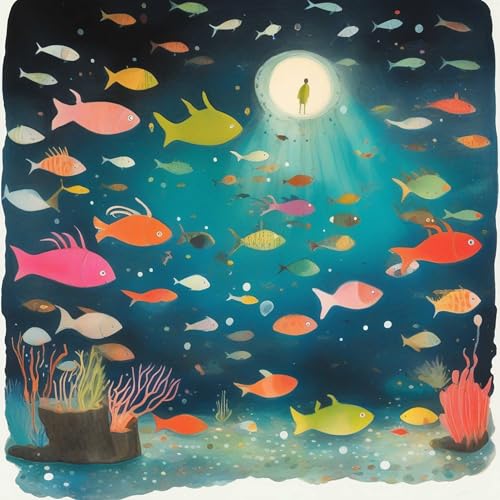
Why Fish Don’t Exist: An Engaging Audio Summary of Lulu Miller's Insightful Journey
Failed to add items
Sorry, we are unable to add the item because your shopping cart is already at capacity.
Add to basket failed.
Please try again later
Add to Wish List failed.
Please try again later
Remove from Wish List failed.
Please try again later
Follow podcast failed
Unfollow podcast failed
-
Narrated by:
-
By:
About this listen
In "Why Fish Don't Exist," Lulu Miller intricately weaves a narrative that explores existential themes through the life of the little-known scientist David Starr Jordan, who dedicated his work to classifying fish but faced numerous personal and professional challenges. The book delves into the paradox of scientific pursuit and the fragility of life, illustrating how Jordan’s experiences—his attempts to impose order on nature amid chaos—mirror broader human struggles with meaning, categorization, and the inevitability of disorder. Through a blend of biography, memoir, and philosophical reflection, Miller ultimately examines the dance between our desire for certainty and the reality that everything in the natural world, including our understanding of it, is inconstant.
2 Key Concepts of Why Fish Don't Exist
In Chapter 1 of "Why Fish Don't Exist" by Lulu Miller, the theme of chaos and the search for meaning in an unpredictable world is introduced, setting the tone for the exploration of existence amidst disorder. This theme reemerges in later chapters, particularly in Chapter 3, which discusses the randomness of life and the challenges of categorizing nature, and in Chapter 7, which delves into the struggle against existential despair and the quest for understanding within the chaos of scientific inquiry.
3 In-Depth Chapter Analysis of Why Fish Don't Exist by Lulu Miller
In Why Fish Don’t Exist, Lulu Miller intricately weaves her narrative through various chapters, each contributing to the overarching theme of chaos versus order in the natural world. In Chapter 2, titled "The Axolotl," Miller juxtaposes the surreal biology of the axolotl with the human desire to categorize and understand life. This chapter explores the idea of how such creatures challenge our understanding of biodiversity and classification, which reflects the theme of chaos within nature. For example, Miller illustrates how the axolotl's ability to regenerate limbs defies the expected limitations of biological life, posing questions about existence and identity that resonate throughout the book.
Later in Chapter 5, "The Scientist and the Sleepers," Miller delves deeper into the conflict between the structured approach of science and the inherent unpredictability of life. This chapter focuses on taxonomist David Starr Jordan and his ambitious classification of fish, which is soon shattered by the chaos of extinction and disorder in the natural world. Miller poignantly describes Jordan’s obsessive quest to bring order to the seemingly chaotic universe of species, only to be met with the humbling realization of life's fragility. This highlights the tension between humanity’s desire for clarity and the unruly essence of existence itself, emphasizing that even within scientific pursuits, the uncertainties of life remain unavoidable.
1.Listen Why Fish Don't Exist Audiobook summary at Bookey
https://www.bookey.app/audiobook/why-fish-don%27t-exist
2.Buy Why Fish Don't Exist at Amazon
https://www.amazon.com/s?k=why+fish+don%27t+exist
3.Buy Why Fish Don't Exist at Kobo
https://www.kobo.com/us/en/search?query=Why Fish Don't Exist&fclanguages=en
4.Search Why Fish Don't Exist at worldcat
https://search.worldcat.org/en/search?q=Why Fish Don't Exist&offset=1
No reviews yet
In the spirit of reconciliation, Audible acknowledges the Traditional Custodians of country throughout Australia and their connections to land, sea and community. We pay our respect to their elders past and present and extend that respect to all Aboriginal and Torres Strait Islander peoples today.


